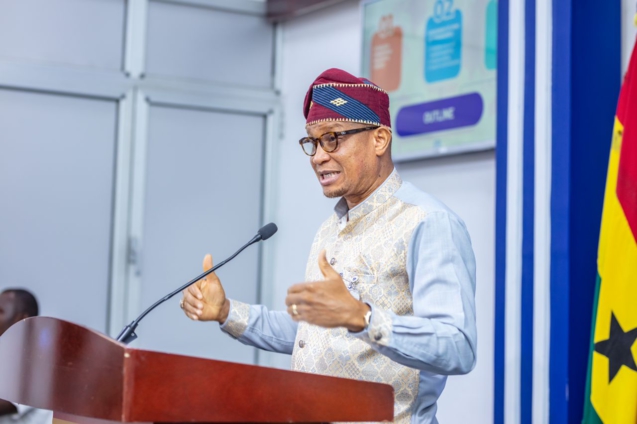The Chief Executive Officer of the National Petroleum Authority has stated that changing the Arabic and Islamic educational curricula to suit modern trends is the ideal way to place Muslim students at par with others in the secular education.
That, Dr Mustapha Abdul-Hamid said, must come with hard work, effective collaborations and unity of purpose to move Muslim children from the “conservative syllabi” to modern-day trends that would broaden the horizon of the students.
He said Muslims could no longer continue to dwell on Syllabi that were always theory in nature and completely out of practicality, a situation he described as “dry theology.”
“Muslim children cannot be knowledgeable in ICT, Environment, Technology, Science and creative arts if our syllabus is still based on religious tenets instead of the Broadway educational system non-Muslim students enjoy.”
Dr Abdul-Hamid stated this during a three-day seminar with the National Council for Curriculum and Assessment on developing Islamic studies curricula for the Muslim community in Ghana.
The Seminar which was organised by T’alim Ghana, a Ghanaian Islamic Non-Governmental Organisation in collaboration with The World Muslim Community Council, from Abu Dhabi, United Arabs Emirates and Education without Borders, attracted 30 participants.
Themed: “Islamic Teaching and Learning; Training for Specialists and developing Islamic Curricula”, the Seminar would among other issues come out with challenges of Islamic education, what they can do to equal other students in the secular realms and way forward to fast-track educational progress among Muslim students.
Dr Abdul-Hamid said from his experience as the former Minister of Inner-Cities and Zongo Development, he realized that Muslim students lagged behind at the secular education sector, chiefly because Arabic and Islamic studies were more of religious based than secular.
He called on Muslim Scholars to be assertive in their engagement with government to be able to come out with good and effective syllabus and curricula that would uplift Muslim students and eschew individual ideological beliefs that could lead to disunity and disintegration among Muslim sects.
On wearing of hijab among Muslim ladies, Dr Abdul-Hamid said it was a manifestation of the faith of Muslim ladies, equating it to the wearing of school uniform, used in identifying students and their schools.
As Muslims, he urged them to be assertive in their engagements by giving benchmarks that they would not fall below, but build their capacities in curricula development that would inure to the benefit of Muslims in Ghana and beyond.
He said the state had over the years recognized that religion was part of Ghanaians, hence the establishment of Catholic, Presbyterian, Anglican, Methodist, Islamic and Ahmaddiyya Educational Units across country.
“If you want to know much about Catholicism, ask a Catholic and if you want to know much about Islam, ask a Muslim.”
He said the Islamic Holy Book was eternal and spoke about all generations, and should not be changed but the Experts need to redesign and develop new ways of meeting the demands of the current Muslim generations to be at par with others.
He said times were changing and Dubai, a typical Islamic state would soon host COP 28 to deliberate on Climate Change, Environment, Science and other development issues and Muslims need to re-adjust their understanding of development through such topical issues.
“That will show the world that our religion has the principles for development and not just dwelling on only Hadiths.”
Mr Hasan Al Marzouqi, Deputy Secretary General of the World Muslim Communities Council said their goal is to support Muslim organisations and Associations to develop and design scholarly materials to enrich Islamic education in the world.
He urged the Muslim community in Ghana to take advantage to research in areas that would be useful for the Religion and society in general.
He commended Dr Abdul-Hamid for his Crusading Job in the Islamic educational sector and urged him to continue blazing the trail for others to emulate.
Dr Abdullah Musah Abdullah, Head of Translators at UNIMAC said it was sad that about 60 per cent of students who learnt Arabic in schools were non-Muslims and advised Muslim students to take advantage of the changing trends to study it.
He mentioned lack of textbooks, training centres, Teachers and infrastructure as major challenges militating against the learning of Arabic and Islamic studies in schools.
He also called for the change of the cognitive learning, which did not help them to understand, but rather just learn for examination purposes.
Latest Stories
-
Expansion Drive: Takoradi Technical University increases faculties
3 hours -
SHS heads demand payment of outstanding funds before reopening of schools
3 hours -
We thank God for the 2024 general elections – Akufo-Addo
3 hours -
Coconut Grove Beach Resort marks 30 years of excellence with memorable 9 lessons & carols service
4 hours -
WAFU B U-17 Girls’ Cup: Black Maidens beat Nigeria on penalties to win inaugral tournament
4 hours -
Real Madrid beat Sevilla to keep pressure on leaders Atletico
5 hours -
Liverpool put six past Spurs to go four points clear
5 hours -
Manchester United lose 3-0 at home to Bournemouth yet again
5 hours -
CHAN 2024Q: ‘It’s still an open game’ – Didi on Ghana’s draw with Nigeria
6 hours -
CHAN 2024Q: Ghana’s Black Galaxies held by Nigeria in first-leg tie
7 hours -
Dr Nduom hopeful defunct GN bank will be restored under Mahama administration
7 hours -
Bridget Bonnie celebrates NDC Victory, champions hope for women and youth
7 hours -
Shamima Muslim urges youth to lead Ghana’s renewal at 18Plus4NDC anniversary
8 hours -
Akufo-Addo condemns post-election violence, blames NDC
8 hours -
DAMC, Free Food Company, to distribute 10,000 packs of food to street kids
10 hours

